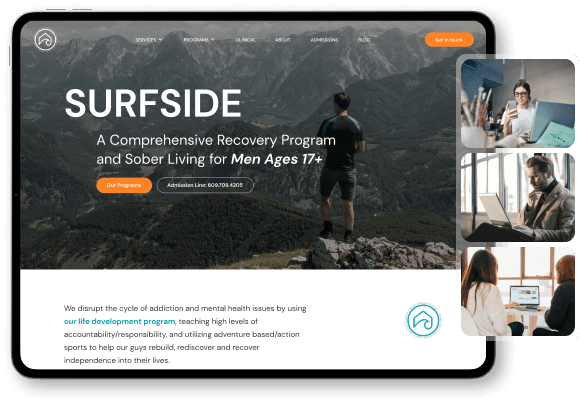blog
The Importance of Mobile-Friendly Design for Mental Health Websites
Nov 8, 2024
In today’s digital age, more people are relying on mobile devices to access information, including mental health services. Whether clients are seeking support for mental health conditions or searching for a therapist during a stressful time, they are likely to use smartphones, tablets, or other mobile devices to connect with providers. This is why having a mobile-friendly website is no longer optional—it’s a necessity.
In this article, we’ll explore the critical importance of mobile optimization for mental health websites and how a responsive design can significantly impact client engagement, trust, and accessibility. By understanding the need for a mobile-optimized site, mental health providers can create a seamless experience for users, ensuring potential clients can access the help they need, no matter where they are or what device they’re using.
1. Mobile-First Clients: Reaching Users on the Go
For many people, smartphones are the primary device they use to browse the internet. According to recent statistics, over 60% of all internet traffic comes from mobile devices, a trend that continues to grow year after year. As mobile usage increases, mental health clients are increasingly searching for services through their phones—whether they’re at home, in the car, or on the go.
Why Mobile Optimization is Essential:
Instant Access: When a client needs help, they want to find it quickly. A mobile-friendly website ensures they can access information and book appointments without delays or frustration.
On-the-Go Support: Many individuals may seek mental health support during stressful or urgent situations. If your website isn’t mobile-friendly, it could discourage them from reaching out during crucial moments.
Higher Client Retention: If clients have a smooth, pleasant experience on their mobile devices, they are more likely to return to your site or recommend your services to others.
By ensuring your website is optimized for mobile, you increase the likelihood that clients will take action and seek the mental health support they need, regardless of where they are.
2. Responsive Design: A Seamless Experience Across Devices
Mobile-friendly websites are built using responsive design, which ensures that the website adapts to different screen sizes and resolutions. Whether a potential client is using an iPhone, Android device, or tablet, a responsive design guarantees that the website looks and functions optimally, regardless of the device.
Benefits of a Responsive Design:
Consistent User Experience: Clients experience the same easy-to-navigate site whether they visit it from their phone or desktop. This builds trust and improves the overall user experience.
Improved Readability: On a mobile-optimized site, text is easy to read, buttons are appropriately sized, and navigation is simple—making it easier for clients to find information about services, book an appointment, or contact you for further inquiries.
Faster Load Times: Mobile optimization reduces load times, which is crucial for keeping visitors engaged. Slow websites lead to high bounce rates, where clients leave before they have a chance to interact with your content or schedule an appointment.
A responsive website adapts to the user’s needs, providing a seamless and accessible experience that can increase client conversion rates.
3. Improved Search Engine Rankings: SEO Benefits of Mobile Optimization
Search engines, especially Google, have made mobile optimization a ranking factor in their algorithms. Websites that are mobile-friendly are more likely to appear higher in search results, helping mental health providers stand out and reach more potential clients.
How Mobile Optimization Affects SEO:
Higher Search Engine Ranking: Google prioritizes mobile-friendly websites in search results, meaning that if your site isn’t optimized for mobile, it could be buried behind competitors’ websites that are mobile-responsive.
Local SEO: Many clients search for mental health services “near me” using their mobile devices. A mobile-optimized website improves your chances of showing up in local search results when people are searching for mental health support in their area.
Reduced Bounce Rates: Google also tracks bounce rates, which measure how quickly users leave your website. A poorly optimized mobile site can lead to high bounce rates, negatively impacting your SEO rankings.
By making your website mobile-friendly, you not only improve user experience but also increase your chances of being found by potential clients through search engines.
4. Accessibility for All Clients: Meeting a Wide Range of Needs
Mental health services must be accessible to all individuals, including those who may face challenges related to disabilities. Mobile optimization ensures that your website is usable for people with different needs, offering a better overall experience and increasing the chances that they will seek support.
Accessibility Features in Mobile Design:
Screen Reader Compatibility: Mobile-friendly websites often work better with screen readers, making it easier for individuals with visual impairments to navigate the site.
Voice Search: Many mobile users rely on voice search to find information. Optimizing your site for mobile allows users to search for mental health services more easily using voice commands.
Easy Navigation: Mobile-friendly websites feature intuitive navigation that helps clients with cognitive impairments or those who need extra time to interact with the content.
By improving mobile accessibility, you create a more inclusive experience that helps people from all walks of life find the mental health services they need.
5. Fostering Trust and Professionalism
In the mental health field, trust is key to building client relationships. A mobile-optimized website reflects a level of professionalism and attention to detail that reassures clients that they are in safe hands. An outdated, hard-to-navigate website can have the opposite effect, potentially leaving visitors frustrated and uncertain about your services.
How Mobile Optimization Builds Trust:
Professional Appearance: A mobile-friendly website looks polished and modern, signaling that you are invested in providing the best possible experience for your clients.
Clear Communication: Mobile optimization ensures that important information like your contact details, appointment scheduling, and therapist bios are easily accessible, helping clients make informed decisions.
Reduced Frustration: A smooth, user-friendly experience prevents potential clients from becoming frustrated, making them more likely to reach out for help.
When clients feel comfortable navigating your website and can easily access the information they need, it builds trust and encourages them to follow through with contacting you.
6. Increased Engagement and Conversion Rates
A mobile-optimized website can directly influence your conversion rates. When potential clients can easily navigate your site on their phones, they are more likely to take the next step, whether it’s scheduling an appointment, signing up for a newsletter, or reaching out for further information.
Key Features to Boost Engagement on Mobile:
Easy-to-Find Contact Forms: Ensure that your contact or booking forms are easy to fill out on mobile devices, with large, clickable buttons and simple fields.
Quick Navigation: Minimize the number of steps required to get from your homepage to your contact page or booking form. A mobile-friendly site ensures clients can find what they need in just a few clicks.
Interactive Features: Offer features like live chat, online appointment scheduling, or quizzes that allow users to engage with the website and move further along in their journey.
Mobile optimization leads to higher engagement, ensuring that clients are more likely to take the next step in their mental health journey.
Conclusion: Why Mobile-Friendly Design is Essential for Mental Health Websites
A mobile-friendly website is essential for any mental health practice looking to connect with clients in today’s digital world. With increasing numbers of individuals relying on smartphones and tablets to search for support, optimizing your website for mobile devices ensures that clients can access your services no matter where they are. Mobile optimization boosts SEO rankings, enhances accessibility, fosters trust, and improves overall user experience—all of which ultimately drive higher engagement and conversion rates.
By prioritizing mobile design, mental health professionals can create a seamless, responsive experience that helps clients feel confident and supported when seeking help online. As the digital landscape continues to evolve, investing in mobile optimization is no longer just a good idea—it’s a vital component of a successful online presence.
Do you find this article useful?
We create beautiful websites for mental health businesses that will help families and people in need to make the right choice. Let us help you improving your website, we got the experience and the passion to convert visitors into customers.
Get in touch and let us help you with your website
Prev
Next



